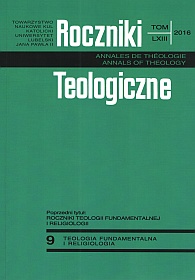Out of Meta-Ecclesiology
Abstract
Meta-Theology denotes a meta-theoretical description of Theology. Similarly, meta-Ecclesiology means a meta-theoretical description of Ecclesiology, and it encompasses all problems of meta-theological nature. Meta-Ecclesiology – like Meta-Theology – might be external or internal. This paper represents an internal Meta-(Catholic) Ecclesiology. It touches on some new issues in the area of Ecclesiology, types of Ecclesiology, trends in Ecclesiology, and models of the Church according to Cardinal Avery Dulles (the Church as Institution, Mystical Communion, Sacrament, Herald, Servant, Community of Disciples, and Sign of Opposition).
Multiplicity and diversity of ecclesiological types and trends show a richness and complexity of Ecclesiology. Consequently, one holistic (total) Ecclesiology is impossible at present. Hence, a project of an integral Ecclesiology is feasible but only as (a very useful) way of uniting the results of Ecclesiology – uniting them on a base of main ecclesiological issues or problems faced by Ecclesiology. According to Rev. M. Rusecki (1942-2012) theology today is very much fragmented and it is quite impossible to make it integrated (see: M. Rusecki, Problematyka metody w teologii, in: Tożsamość teologii, ed. A. Anderwald, T. Dola, M. Rusecki, Opole: Wydział Teologiczny Uniwersytetu Opolskiego 2010, pp. 44-47, 54-64. Rusecki presents Adolf Kolping’s idea of integrated theology – pp. 55-56). New theological disciplines and sub-disciplines arise and theologians’ specializations are becoming increasingly fragmented. They are to a lesser extent familiar with the work of their colleagues (native or foreign) and likewise with the history of Theology. The same holds true for Ecclesiology and ecclesiologists. Today in Theology (and in Ecclesiology) there are processes typical of contemporary sciences which are unstoppable. Despite negative consequences, there are some positive, too. Being so, Theology and Ecclesiology show their vitality and necessity. Theologians in their academic work explore new ways of research (including interdisciplinary ones) and have more scholar freedom than they used to, which develops their creativity.
References
Bartnik Cz.S., Eklezjologia. I. W teologii katolickiej, w: Encyklopedia Katolicka, red. R. Łukaszyk, L. Bieńkowski, F. Gryglewicz, Lublin: TN KUL 1985, t. IV, kol. 773-781.
Bartnik Cz.S., Kościół, Lublin: Wydawnictwo KUL 2009.
Bronk A., Majdański S., Teologia – próba metodologiczno-epistemologicznej charakterystyki, ,,Nauka” 2(2006), s. 81-110.
Chrześcijaństwo jutra. Materiały II Międzynarodowego Kongresu Teologii Fundamentalnej (Lublin, 18-21 IX 2001), red. M. Rusecki, K. Kaucha, Z. Krzyszowski, I.S. Ledwoń, J. Mastej, Lublin: TN KUL 2001.
Dulles A., Models of the Church, New York: Doubleday 1987.
Kantyka P., Ku wspólnemu rozumieniu Kościoła. Eklezjologia dialogu katolicko-metodystycznego, Lublin: Wydawnictwo KUL 2008.
Kaucha K., Eklezjologia fundamentalna. Zagadnienia metodologiczne, ,,Roczniki Teologii Fundamentalnej i Religiologii” 1(56)2009, s. 29-46.
Kaucha K., Kontekstualno-europejska eklezjologia fundamentalna, ,,Roczniki Teologiczne” 48-49 (2001-2002), z. 9, s. 29-52.
Kaucha K., Wiarygodność Kościoła, w: Kościół w czasach Jana Pawła II, red. M. Rusecki, K. Kaucha, J. Mastej, Lublin: Wydawnictwo KUL, Wydawnictwo ,,Gaudium” 2005, s. 339-344.
Kaucha K., Wiarygodność Kościoła w kontekście wyzwań współczesności europejskiej w świetle nauczania Jana Pawła II, Lublin: Wydawnictwo KUL 2008.
Lohfink G., Czy Bóg potrzebuje Kościoła? O teologii ludu Bożego, tł. E. Pieciul-Karmińska, Poznań: W drodze 2005.
Michalik A., Zrozumieć chrześcijaństwo. Istota chrześcijaństwa według Josepha Ratzingera, Tarnów: Wydawnictwo Biblos 2008.
Międzynarodowa Komisja Teologiczna, ,,Sensus fidei” w życiu Kościoła, Kraków: Wydawnictwo Księży Sercanów 2015.
Minear P., Images of the Church in the New Testament, Philadelphia: Westminster 1960.
Mondin B., La Chiesa primizia del regno. Trattato di ecclesiologia, Bologna 1986.
Mondin B., La Chiesa sacramento d’amore. Trattato di ecclesiologia, Bologna 1993.
Mondin B., Le nuove ecclesiologie, Roma: Paoline 1980.
Nadbrzeżny A., Sakrament wyzwolenia. Zbawcze posłannictwo Kościoła w posoborowej teologii holenderskiej, Lublin: Wydawnictwo KUL 2013.
Napiórkowski A.A., Przyczynek do metodologii eklezjologii integralnej, ,,Studia Nauk Teologicznych PAN” 2(2007), s. 175-188.
Napiórkowski S.C., Jak uprawiać teologię, Wrocław: TUM 1994.
Przygoda W., Eklezjologia pastoralna, w: Leksykon teologii pastoralnej, red. R. Kamiński, W. Przygoda, M. Fiałkowski, Lublin: TN KUL 2006, s. 234-235.
Rahner K., Strukturwandel der Kirche als Aufgabe und Chance, Freiburg: Herder 1972.
Rok Wiary – rok odnowy, red. K. Kaucha, A. Pietrzak, W. Rebeta, Lublin: Wydawnictwo KUL 2013.
Rusecki M., Biblia jako tradent i aktualizator Objawienia. Aspekt metodologiczny, w: Biblia w teologii fundamentalnej (Biblioteka Teologii Fundamentalnej, t. V), red. J. Perszon. Toruń: Wydawnictwo Naukowe UMK 2010, s. 113-133.
Rusecki M.: Problematyka metody w teologii, w: Tożsamość teologii, red. A. Anderwald, T. Dola, M. Rusecki, Opole: Wydział Teologiczny Uniwersytetu Opolskiego 2010, s. 43-83.
Rusecki M., Traktat o Kościele, red. K. Kaucha, P. Królikowski, J. Mastej, Lublin: Wydawnictwo KUL 2014.
Rusecki M., Wiarygodność chrześcijaństwa, t. 1: Z teorii teologii fundamentalnej, Lublin: TN KUL 1994.
Salato N., Persona e Chiesa: un sentiero interrotto. Indizi per un personalismo ecclesiologico, Trapani: Gruppo editorial Il Pozzo di Giacobbe 2013.
Seweryniak H., Metodologia eklezjologii fundamentalnej. Demonstratio catholica, ,,Studia Nauk Teologicznych PAN” 2(2007), s. 117-144.
Van der Ven J.A., Ecclesiology in Context, Grand Rapids (Michigan)–Cambridge (U.K.): W.B. Eerdmans Publishing Company 1996.
Van der Ven J.A., Empirical Methodology in Practical Theology: Why and How?, ,,Pastoraltheologische Informationen” 15(1995), nr 1, s. 135-154.
Waldenfels H., O Bogu, Jezusie Chrystusie i Kościele dzisiaj. Teologia fundamentalna w kontekście czasów obecnych, tł. A. Paciorek, Katowice: Księgarnia św. Jacka 1993.
Wąsek D., Nowa wizja zarządzania Kościołem (Myśl Teologiczna, t. 84), Kraków: Wydawnictwo WAM 2014.
Wiarygodność chrześcijańskiego orędzia zbawienia (Biblioteka Teologii Fundamentalnej, t. X), red. P. Artemiuk, Płock: Płocki Instytut Wydawniczy 2015.
Copyright (c) 2016 Roczniki Teologiczne

This work is licensed under a Creative Commons Attribution-NonCommercial-NoDerivatives 4.0 International License.





